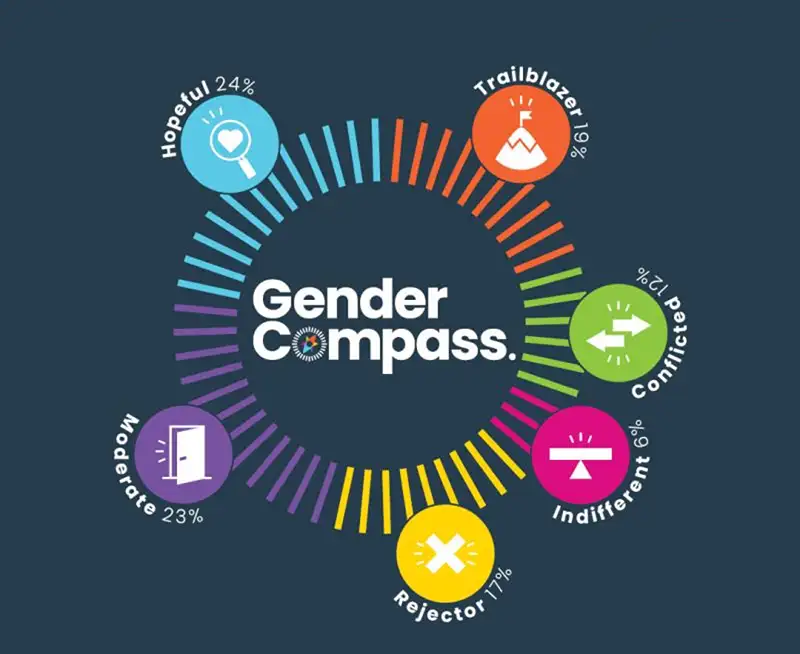How far have we really come when it comes to gender equality in Australia? The answer is more complicated — and more surprising — than you might think.
Around the world, momentum on gender equality is slowing – prompting us to ask: What’s happening in our own backyard?
To continue making progress, we need to understand what Australians believe, what drives their behaviour, what holds them back, and which stories resonate — so we can build broad, lasting support for gender equality.
Plan International Australia and 89 Degrees East, with support from Minderoo Foundation, has launched the second stage of its Gender Compass research, offering fresh insight into Australia’s evolving gender equality attitudes.
Stage 1 of the Gender Compass segmented the Australian public into six distinct groups based on their attitudes toward gender equality.
Now, Stage 2 of the Gender Compass takes it a step further, using deeper insights to better understand each of the six groups and how they respond to various messages.
The research method
Stage 2 of the Gender Compass research began with exploratory research involving focus groups and conversational AI prompts to deepen our understanding of each of the six segments and refine messaging concepts.
Between November and December 2024, these insights were then tested through a nationally representative online survey of 2,048 Australians aged 16 and over (with age, gender, and location quotas applied to ensure balanced representation) and also assessed reactions to different messages.
In this blog, we’re unpacking five surprising insights drawn from this research — offering a deeper look into how Australians think about gender equality and why it matters for driving real change.

The 6 Gender Compass segments: How Australians think about equality
- Trailblazers (19%) – Passionate, proactive, driven by lived experience.
- Hopefuls (24%) – Supportive and optimistic, but less vocal or urgent.
- Conflicted (12%) – Torn between progressive and traditional values.
- Moderates (23%) – Mildly positive but disengaged and see gender equality as already achieved.
- Indifferent (6%) – Apathetic, unaware, and disconnected from the issue.
- Rejectors (17%) – Believe efforts to address gender equality have gone too far and are resistant to further conversation or change.
5 things you didn’t know about how Australians really feel about gender equality
1. Most Australians care about gender equality – but many think the job is already done
The great news? An overwhelming majority of Australians (9 out of 10) believe gender equality is important.
But here’s the catch: 6 in 10 think we are close to or have already achieved it.
So, while support for gender equality in principle is high, 60% of Australians believe we’re either already in a society where women have the same rights, opportunities and outcomes as men, or are very close.
The reality? The World Economic Forum (2025) tells us we’re still 134 years away from true gender equality.
So if people care about gender equality, but think it is mostly realised, that limits urgency and action.
Further, if people can’t see the inequality, any efforts to advance equality can be seen as creating an imbalance or going ‘too far’.
As of right now, only 1 in 10 Australians believe we’re far from achieving gender equality.
134 years feels pretty far off—don’t you think?
2. Language matters more than you think
You’ve probably heard the phrase, “let’s not argue over semantics.”
But when it comes to gender equality, the language we use really does matter.
Words can inspire action or shut it down. They can build connection — or create division.
And when aiming to build broad support and action for gender equality, these nuances can make all the difference.
Take the Trailblazers, for example. This segment is comfortable with academic language and systemic explanations of inequality.
But for other groups, that same language can be alienating.
Just having the vocabulary to talk about gender equality is a hard-earned privilege. And while Stage 2 of the Gender Compass gives us new insights into how to activate more Australians than ever before, it’s just as important to continue engaging Trailblazers — the issue’s most dedicated champions.
That includes helping Trailblazers understand why inclusive, everyday language is key to bringing others along. It's not about dumbing things down — it's about opening the door to people who aren’t yet fluent in the language of equality.
One of the most significant findings from Stage 2 is the emergence of groups that are ‘moveable’ and open to gender equality messaging including Hopefuls, Moderates, and the Conflicted.
Together, they represent nearly two thirds of Australians. They’re open to being a part of the conversation, but we need to meet them where they’re at.
To reach this group effectively, the research suggests that messaging should:
- Focus on broadly resonant values like freedom, safety, and opportunity
- Use inclusive language (we, us, everyone) and write people of all genders into the story
- Avoid jargon and abstract ideas—rather than saying “patriarchy,” say it in plain language
- Highlight how rigid gender norms harm everyone, not just women
- Keep messages grounded in everyday life and relatable experiences
Other segments need a more tailored approach.
The Indifferent segment, for example, isn’t opposed to gender equality — it just doesn’t feel relevant to their daily lives. To reach them, messaging should be relatable, and clearly tied to everyday benefits.
The Rejectors are by definition more resistant. Many feel blamed or left behind and believe gender equality have gone too far. For this group, accusatory or structural injustice language can further polarise and reinforce their resistance.
Convincing this segment will take significant effort, and engaging in debate may only escalate tensions.
Instead, we can help drive change by communicating with the ‘moveable middle’ using language that doesn’t antagonise Rejectors.
3. A third of Australians believe men are under attack
1 in 3 Aussies feel that the tide is now turning on men — a sentiment especially common among Rejectors and Conflicted segments.
37 per cent of Australians believe men are “under attack” for everything they say and do.
34 per cent agree that men don’t get enough credit for their contributions.
Alongside this, there’s a strong undercurrent of zero-sum thinking in these groups.
So, what is zero-sum thinking? It’s the belief that progress for women must come at the expense of men.
Here’s an analogy to help explain it:
Zero-sum thinking assumes that passing the ball more to one player means others lose out. But real progress is like a winning team — everyone plays better when each player is supported and able to contribute.
After all, studies show that:
- Companies with greater gender diversity in leadership are more profitable and innovative.
- Countries with strong parental leave for both parents see better child development and stronger family wellbeing.
- Men in more gender-equal societies report better mental health outcomes and life satisfaction.
4. Many Australians believe that women simply choose different paths
Over a third of Australians think women simply choose different paths — like pursuing lower-paid careers or choosing to step back from work to raise kids — rather than acknowledging the impact of gendered expectations and systemic barriers.
This belief shifts responsibility away from the systems we live in, and onto individual decision-making.
But in reality, the choices women make are often shaped by deeply embedded social norms, limited policy support, and a lack of structural flexibility.
For example:
- Women are more likely to take on unpaid care because paid parental leave and childcare access remain uneven.
- Female-dominated industries are often lower paid and undervalued.
- Leadership pathways are often less accessible to women due to bias, lack of mentorship, or inflexible work structures.
Framing inequality as a matter of personal choice reinforces the myth that we’ve already achieved equality — and reduces urgency to address the barriers that still exist.
5. Australians are open to talking about gender equality – especially at work
We end with one of the most encouraging findings from Stage 2 of the Gender Compass.
Australians are open to having conversations about gender equality. In fact, three in four support these discussions taking place in the workplace.
Despite the noise around cancel culture and backlash to feminist rhetoric online, most Australians said they would feel hopeful, proud, and safe having these conversations, particularly at work.
This suggests that the workplace could be a powerful setting for progress.
With the right language, leadership, and tools, this openness could translate into meaningful steps toward lasting change.

The research offers a clear takeaway for gender equality advocates.
If we want to build lasting support for gender equality — and turn back the 134-year clock on progress — we need to rethink how we communicate.
The Gender Compass shows that the key to accelerating change could lie in engaging the moveable middle — a large group of Australians who are open to supporting gender equality solutions if we engage them in the right conversation.
The findings offer valuable insights into how we can bring more people into the conversation. But in doing so, it’s important that we don’t alienate the Trailblazers — those already leading the charge.
While the Indifferent may take longer to engage, and the Rejectors remain the most resistant, thoughtful, values-driven communication can help keep the door open — and prevent greater disengagement and division.
We’re proud to have partnered with Plan International Australia to bring these insights to light — and we hope they serve as a powerful roadmap for advocates working to build broader, more inclusive support for gender equality — for the benefit of us all.
Curious where you sit on the Gender Compass?
Explore the six segments and find your place here.
Get the latest from Minderoo Foundation
Stay in the loop on the latest insights and updates on gender equality. Subscribe to our newsletter here and stay informed.
By signing up with your email, you agree to Minderoo Foundation’s Privacy Policy.